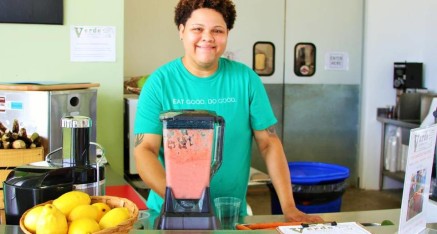Seeds of Change: Verde Community Farm in Homestead is Helping to Grow South Miami-Dade's Foodie Appeal
By Caitlyn Granfield
Parts of the former Homestead Air Force Base, left vacant for more than two decades after Hurricane Andrew’s fury, have been reborn as a 22-acre organic farm and farmers market, an eco-friendly housing complex for the formerly homeless, and a recently added open-air café that serves a true farm-to-table experience.
Verde Community Farm and Market, managed by Urban Oasis Project and Carrfour Supportive Housing, is positioning itself as an agro-tourism hub while providing work opportunities to people transitioning out of homelessness.
“If you want to know where your food comes from and get connected to it,” said Chuck Lyons, Verde Farm’s manager, “you can come here, go see the farm, you can see where we grow something that you’re going to have in your salad.”
Produce grown on the two-year-old farm is available for purchase onsite at Verde Market and at Urban Oasis Project’s farmers markets throughout Miami-Dade County and is on the menu at restaurants from chefs like Michael Schwartz and baker Zak Stern.
Fruits and vegetables grown on the farm also are used to make sandwiches, salads and smoothies at Verde Kitchen Café, which had a soft opening in July. Verde Kitchen, coupled with the farm and “green” townhouses, gives residents of the community a sustainable work-life model.
Gresia “Geo” Gomez, 33, who lives in one of the affordable residences, called Verde Gardens, combines creamy mamey fruit with milk and chia seeds into a blender — a smoothie for a new customer.
Feels more alive
She and nine other residents work at the café and in the kitchen, while five others transitioning out of homelessness work on the organic farm, learning job skills as part of the housing development’s mission to promote self-sufficiency and camaraderie among residents.
“I’m learning more about plants, especially fruits and vegetables and what they’re good for,” Gomez said, noting that she has shed 60 pounds and has picked up better eating habits by living and working at Verde. “There’s no GMOs or additives — it’s natural. I actually feel more alive by eating healthier.”
As operations expand, Verde will bring on more formerly homeless people as workers and residents.
“Everything that you spend here goes back to the community,” said Francesca Steele, Verde Gardens’ program director. “So it’s not only that you’re having this experience and you’re having yummy food, it’s that you’re putting back into a community that’s going to benefit from all of it.”
This sustainable community model, believed to be the first of its kind in South Florida, generates revenue from the café and market, and uses it to pay for employees and cost of goods. Grant money goes toward health, financial and psychological services for residents.
Learning skills
Eventually, the hope is that the formerly homeless staffers, many of whom have little or no prior work experience, will have learned enough skills through working there to prepare them for “real-world” jobs outside of the Verde community.
“The idea was to create a holistic and healthy environment so that health permeates all aspects of someone’s life, be it quality affordable housing, to where they work, eat, to what their children are learning in after-school programming,” said Stephanie Berman-Eisenberg, president and CEO of Carrfour Supportive Housing. The agency developed the $14 million, LEED-certified Verde residences that have front porches and lush yards and provide access to a community center and playground.
Carrfour, a nonprofit founded by the Greater Miami Chamber of Commerce to develop and manage affordable housing, receives funds from Miami-Dade County’s Homeless Trust. After Hurricane Andrew reduced the former Air Force base to rubble, the federal government deeded land to Miami-Dade County, which then endowed it to the Homeless Trust. The Trust contracted Carrfour Supportive Housing, which collaborated with The Chapman Partnership, a homeless services support program, to build and manage housing.
Verde Café’s menu items feature the likes of umami sliders, made with grass-fed beef from Ocala, to baked goods and leafy choices like the farmhouse salad, made with red dragon fruit, sunflower shoots and microgreens. Local food vendors often rent the kitchen after-hours, so they can make and prepare food items, like jam or fruit preserves, to sell at local farmers markets and at Verde.
Eco-tourism experience
Chef Adri Garcia, co-owner and executive chef for a healthy school-lunch catering service, is in charge of creating new, rotating menu options for the café.
“What we’re doing here is trying to get the whole community in on the same level,” she said.
“It’s not like going to Burger King; we don’t have a Value Meal. But if you think about it, we do, because everything is coming from the ground up, and it’s good for you.”
As part of a national program, Verde Market and Café allows SNAP-eligible customers to receive up to $40 worth of produce for $20, and the farm’s Community Supported Agriculture program matches EBT or SNAP dollars.
“We grow a lot of specialty items,” Lyons said. “We’re not just growing green leaf lettuce. We have like eight different varieties that you’re not going to find at Publix. And more popular crops like kale, spinach, carrots and beets.”
Bill Squire, who is in charge of hiring staff for Verde Market and Café, said he believes Verde will soon bring in the swarms of locals and tourists that currently go to Robert Is Here, Knaus Berry Farm and Schnebly Redlands Winery in search of local foodie experiences in South Miami-Dade.
“You get a whole eco-tourism experience here,” Squire said.
If You Go
What: Verde Community Farm, Market and Café.
Where: 12690 SW 280th St., Homestead.
When: Verde Kitchen Café is open for lunch Tuesday-Saturday.
Prices: Sandwiches and salads $6.50-$12, baked goods $1-$3, juices and smoothies $5.50-$6.50.
More info: verdefarmandmarket.com; 305-257-2005. Email verdemarket@urbanoasisproject.org for farm tours and volunteer opportunities.
SEP

